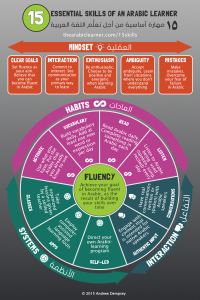 What’s the difference between people who succeed at learning Arabic, and those who don’t?
What’s the difference between people who succeed at learning Arabic, and those who don’t?
I interviewed 6 renowned Arabic language teaching experts, including authors of books like the well known Al-Kitaab series, and asked them this question. They answered me based on their experience with thousands of Arabic learners over decades of teaching. From their answers, I wrote a short summary of the things they talked about that can help you become fluent in Arabic.
The 15 skills include:
- Mindsets
- Habits
- Systems for learning
- Types of interactions
I really enjoyed researching and compiling this short overview. It is made up of a brief description of each of the 15 skills, and a schematic of how they all fit together. By implementing each of the habits, mindsets, systems, and types of interaction, I think you’ll find yourself making real progress in learning Arabic.
The people interviewed include (in alphabetical order):
- Laila Al-Sawi, Senior Instructor of Arabic as a Foreign Language, the American University in Cairo. Co-author of Al-Murshid: A Guide to Modern Standard Arabic Grammar, and Kalaam Gamiil, An Intensive Course in Egyptian Colloquial Arabic
- Abbas Al-Tonsi, Senior Lecturer, Georgetown University Qatar. Co-author of Al-Kitaab fii Tacallum al-cArabiyya (الكتاب في تعلم العربية), Arabiyyat Wasaa’il al-iclaam (عربية وسائل الإعلام) (Media Arabic), Kalaam Gamiil, An Intensive Course in Egyptian Colloquial Arabic, and other books
- Dr. Kirk Belnap, Director, National Middle East Language Resource Center, Brigham Young University. Former Executive Director of the American Association of Teachers of Arabic and editor of its journal, Al-‘Arabiyya, author of research in second language acquisition, language policy and training, and the history of Arabic.
- Dr. Kristen Brustad, Associate Professor, Department of Middle Eastern Studies at the University of Texas at Austin. Co-author of Al-Kitaab fii Tacallum al-cArabiyya (الكتاب في تعلم العربية) and dozens of academic publications related to Arabic language and Arab culture, politics, and society, including books, textbooks, and journal articles.
- Dr. Aiyub Palmer, Assistant Professor of Arabic and Islam, University of Kentucky. Curriculum developer for qasidonline.com, one of the most successful online academic institutes teaching Arabic language.
- Dr. David Wilmsen, Professor of Arabic; Chair, Department of Arabic and Near Eastern Languages, The American University of Beirut. Author of Arabic Indefinites, Interrogatives and Negators: A linguistic history of western dialects, as well as much extensive academic research.
Go further with the 15 skills
Once you have read ‘the 15 Essential Skills of an Arabic Learner’, you’ll also get my weekly blog updates in which I go deeper into each of the fifteen areas. If you’re interested in learning Arabic, I think you’ll find these helpful. Feel free to browse through past entries, send in any questions you may have, join any of the discussions in my blog, or unsubscribe at any time.

 RSS - Posts
RSS - Posts